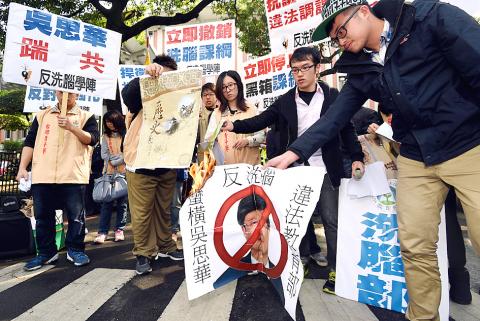A group of student protesters rallied in front of the Ministry of Education building yesterday, demanding the withdrawal of a set of controversial high-school curriculum guidelines that the ministry plans to implement in August — despite a decision by the High Administrative Court on Thursday last week ruling against the proposed changes.
More than 50 protesters — joined by Democratic Progressive Party (DPP) Legislator Huang Wei-cher (黃偉哲) and Taiwan Solidarity Union (TSU) Legislator Chou Ni-an (周倪安) — held placards protesting against what they called the ministry’s illegal act of drafting and implementing the new curriculum guidelines.
The draft amendments to the history curriculum only focus on Taiwanese history, with certain chapters having more than half of their contents revised, National Chengchi University’s Graduate Institute of Taiwan History associate professor Lee Fu-chung (李福鐘) said.

Photo: Lo Pei-der, Taipei Times
The proposed curriculum would replace a pluralistic, global perspective on Taiwanese history with a distinct pro-China bias, as it stresses the contributions of the Qing Dynasty to Taiwan’s development and downplays the role of Japan, he said.
It also reintroduces an outdated term quan fu (光復) — meaning the recovery of Taiwan by the Republic of China from Japanese rule, he said, adding that the term is a throwback to former president Chiang Kai-shek’s (蔣介石) regime.
Ordinary teachers have been excluded from the ministry’s decisonmaking process, Dazhi Senior High School teacher Huang Yi-chung (黃益中) said, and the official notification that a curriculum hearing was to be held arrived only after the registration deadline had expired, Huang said, adding that the ministry refused to disclose records of the hearing in the name of personal data protection.
He said the “defective curricula” should be revoked and teachers should be consulted before curricula are drawn up.
Youth Group in Defense of Taiwan Culture and History activist Lan Shih-po (藍士博) said they held protests against the ministry’s curricular adjustments last year, and he regretted that the ministry had ignored their appeals.
He demanded that the ministry redraft the curriculum guidelines, saying that the ministry’s draft proposal was procedurally flawed according to the High Administrative Court’s ruling. Restoration of Taiwan Social Justice activist Lin Yu-lun (林于倫) said that the ministry’s proposed changes do not do justice to the period of Japanese rule or aboriginal history, adding that the ministry should not serve as a mouthpiece for the Chinese Nationalist Party (KMT) or China.
In response, K-12 Education Administration director Wu Ching-shan (吳清山) said the ministry would consider appealing the court’s ruling after it receives the verdict documentation.
However, the court’s ruling was based on the ministry’s information disclosure, rather than the contents of curricular adjustments, he said.

Taipei has once again made it to the top 100 in Oxford Economics’ Global Cities Index 2025 report, moving up five places from last year to 60. The annual index, which was published last month, evaluated 1,000 of the most populated metropolises based on five indices — economics, human capital, quality of life, environment and governance. New York maintained its top spot this year, placing first in the economics index thanks to the strength of its vibrant financial industry and economic stability. Taipei ranked 263rd in economics, 44th in human capital, 15th in quality of life, 284th for environment and 75th in governance,

Greenpeace yesterday said that it is to appeal a decision last month by the Taipei High Administrative Court to dismiss its 2021 lawsuit against the Ministry of Economic Affairs over “loose” regulations governing major corporate electricity consumers. The climate-related lawsuit — the first of its kind in Taiwan — sought to require the government to enforce higher green energy thresholds on major corporations to reduce emissions in light of climate change and an uptick in extreme weather. The suit, filed by Greenpeace East Asia, the Environmental Jurists Association and four individual plaintiffs, was dismissed on May 8 following four years of litigation. The

A former officer in China’s People’s Liberation Army (PLA) who witnessed the aftermath of the 1989 Tiananmen Square massacre has warned that Taiwan could face a similar fate if China attempts to unify the country by force. Li Xiaoming (李曉明), who was deployed to Beijing as a junior officer during the crackdown, said Taiwanese people should study the massacre carefully, because it offers a glimpse of what Beijing is willing to do to suppress dissent. “What happened in Tiananmen Square could happen in Taiwan too,” Li told CNA in a May 22 interview, ahead of the massacre’s 36th anniversary. “If Taiwanese students or

The New Taipei City Government would assist relatives of those killed or injured in last month’s car-ramming incident in Sansia District (三峽) to secure compensation, Mayor Hou You-yi (侯友宜) said yesterday, two days after the driver died in a hospital. “The city government will do its best to help the relatives of the car crash incident seek compensation,” Hou said. The mayor also said that the city’s Legal Affairs, Education and Social Welfare departments have established a joint mechanism to “provide coordinated assistance” to victims and their families. Three people were killed and 12 injured when a car plowed into schoolchildren and their